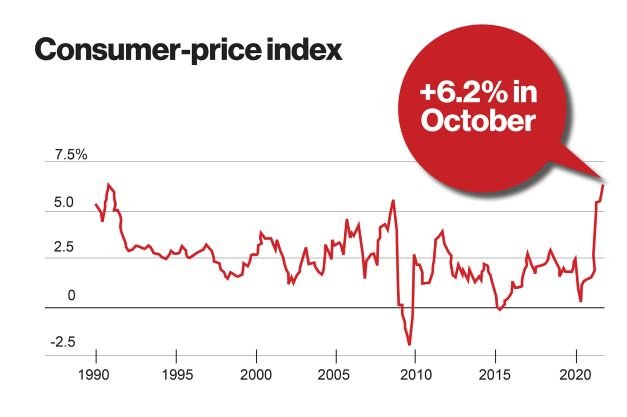What is inflation? And who is at fault?
Those of us who read the headlines every day keep seeing a familiar word: Inflation. In a certain sense, that word is a common part of our vocabulary. We, on a very basic level, understand that as time passes, inflation raises the prices of goods and services. A hamburger, a round of golf, or a gallon of milk don’t cost what they did in 1976. This makes sense.
As is the current landscape of headline writing, though, we keep seeing the dire warnings of inflation and what it means. Indeed, inflation has become a political issue whether we like it or not. Historically, it hasn’t been this way, but everything else has been off-centered in the past two years, why not this?
The occupant of the Oval Office matters less to the economy than the headlines suggest. But this year is different. The government, due to the Covid-19 pandemic, has pumped $2.8 trillion --with a T! -- into the economy over the last 18 months. Then again, statistics are showing we're not spending that much more than we would have in a non-pandemic world. This is evidence that the extra cash floating around may not actually be being spent on goods as much as it is boosting savings accounts, replacing lost wages, or recouping other losses.
The nation’s central bank -- The Fed -- could also be seen as a culprit. Jerome Powell, the chairperson of The Fed, has maintained the inflation surge is mostly due to the attempts to get the economy back to full health after the pandemic and is temporary. Powell and his colleagues at The Fed would typically try to fight inflation by slowing the economy. For obvious reasons, this is counterintuitive in 2021. Let’s also remember that monetary policies don’t reach the masses for a while, so it’s tough to blame the Fed.
In facing the pandemic in the spring of 2020, Corporate America began to do what they needed to do simply to survive the storm of a pandemic. They canceled projects, put a stop on purchases, and laid off workers. These decisions seemed sensible at the time, but turned out to be short-sighted. Now, these companies are facing labor shortages, high shipping and fuel costs, and higher prices for fewer products.
Lastly, inflation could be pinned on the general public. Due to obvious circumstantial reasons, we shifted our purchasing habits to stuff more than services. We spent our money not on vacations and nights on Broadway, but on dishwashers and televisions. Add to that the number of workers is still smaller now than they were pre-pandemic, employers have needed to pay fewer workers more money.
Questions still remain. We could pinpoint portions of blame on President Biden, but also on the banks and Corporate America as well as ourselves. We could also question what policy makers were thinking: Should they have had more foresight into this? Should they have exercised some additional restraint in stimulus money?
We live in an irregular world now. What happens with the pandemic will dictate how quickly Americans return to their old spending habits. What happens with the pandemic will dictate how quickly Americans return to a regular work life. In an era of extremes, we just have to find the middle ground.


